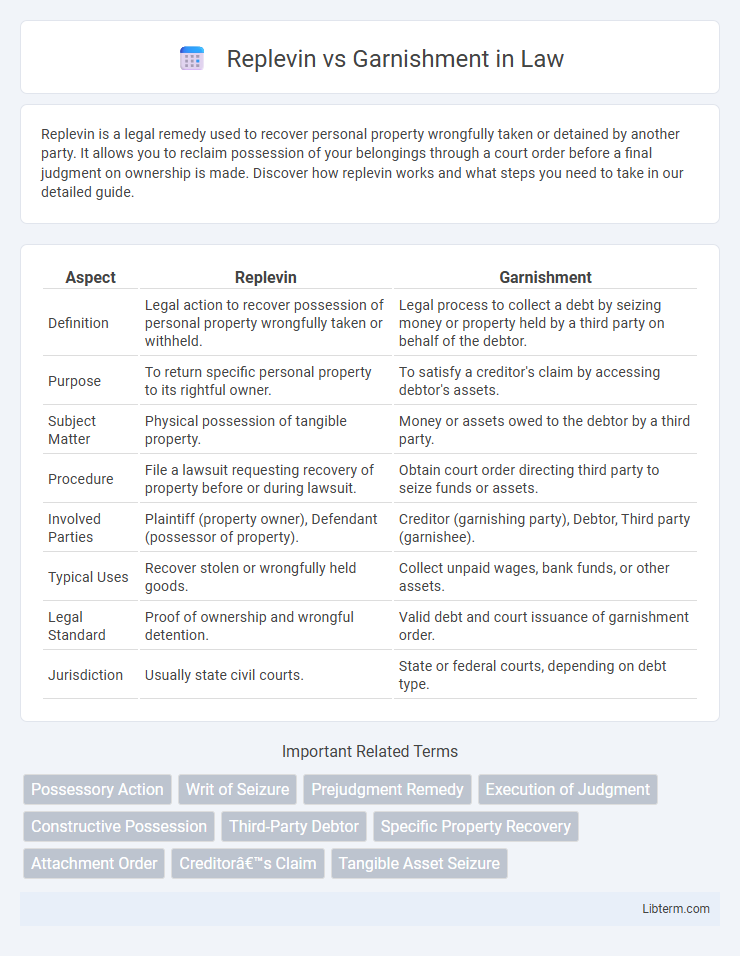Replevin is a legal remedy used to recover personal property wrongfully taken or detained by another party. It allows you to reclaim possession of your belongings through a court order before a final judgment on ownership is made. Discover how replevin works and what steps you need to take in our detailed guide.
Table of Comparison
| Aspect | Replevin | Garnishment |
|---|---|---|
| Definition | Legal action to recover possession of personal property wrongfully taken or withheld. | Legal process to collect a debt by seizing money or property held by a third party on behalf of the debtor. |
| Purpose | To return specific personal property to its rightful owner. | To satisfy a creditor's claim by accessing debtor's assets. |
| Subject Matter | Physical possession of tangible property. | Money or assets owed to the debtor by a third party. |
| Procedure | File a lawsuit requesting recovery of property before or during lawsuit. | Obtain court order directing third party to seize funds or assets. |
| Involved Parties | Plaintiff (property owner), Defendant (possessor of property). | Creditor (garnishing party), Debtor, Third party (garnishee). |
| Typical Uses | Recover stolen or wrongfully held goods. | Collect unpaid wages, bank funds, or other assets. |
| Legal Standard | Proof of ownership and wrongful detention. | Valid debt and court issuance of garnishment order. |
| Jurisdiction | Usually state civil courts. | State or federal courts, depending on debt type. |
Introduction to Replevin and Garnishment
Replevin is a legal remedy that allows a person to recover specific personal property wrongfully taken or withheld, emphasizing the right to possession rather than monetary compensation. Garnishment is a court-ordered process directing a third party, such as an employer or bank, to withhold funds or property owed to a debtor to satisfy a creditor's claim. Both Replevin and Garnishment serve as mechanisms to enforce judgments but differ fundamentally in the type of property targeted and procedural application.
Definition of Replevin
Replevin is a legal remedy that allows a party to recover specific personal property wrongfully taken or withheld by another. It involves a court order directing the return of the property before the final resolution of ownership disputes. Unlike garnishment, which targets a debtor's funds held by third parties, replevin focuses exclusively on the retrieval of physical items.
Definition of Garnishment
Garnishment is a legal process used by creditors to collect a debt by withholding funds directly from a debtor's wages or bank accounts, authorized through a court order. Unlike replevin, which involves the recovery of specific personal property, garnishment targets monetary assets to satisfy outstanding obligations. This remedy allows creditors to secure payment without seizing physical property, streamlining debt recovery through financial institutions or employers.
Key Legal Differences
Replevin involves the recovery of specific personal property wrongfully taken or withheld, allowing the rightful owner to reclaim possession before a final judgment. Garnishment targets a debtor's financial assets or wages held by a third party, enabling creditors to collect money owed through legal seizure. The key legal difference lies in replevin's focus on tangible property recovery versus garnishment's emphasis on accessing monetary funds for debt enforcement.
Types of Property Involved
Replevin typically involves the recovery of specific tangible personal property wrongfully taken or withheld, such as vehicles, equipment, or inventory. Garnishment pertains to the seizure of intangible property, primarily a debtor's wages, bank accounts, or other financial assets held by third parties. The distinction highlights replevin's focus on physical items versus garnishment's targeting of monetary or financial interests.
Legal Procedures for Replevin
Replevin legal procedures involve filing a detailed complaint to recover wrongfully taken or withheld personal property, often requiring proof of ownership and value. Courts may issue a writ of replevin authorizing law enforcement to seize and return the property to the plaintiff pending the resolution of the case. This process typically includes bond posting by the plaintiff to protect the defendant against wrongful seizure, ensuring judicial oversight throughout the property recovery.
Legal Procedures for Garnishment
Garnishment is a legal procedure where a creditor obtains a court order to collect a debtor's wages or bank funds directly from a third party to satisfy a debt. The process typically involves filing a request with the court, serving the garnishment order to the debtor's employer or financial institution, and adhering to statutory limits on the amount that can be withheld. Unlike replevin, which seeks the recovery of specific property, garnishment targets monetary assets through a legally regulated withholding mechanism.
Advantages and Disadvantages
Replevin allows the recovery of specific tangible property, providing a direct remedy for possession but requires proof of ownership and can be time-consuming. Garnishment enables creditors to collect debts by intercepting funds from a third party, offering efficient access to money but may be limited by wage garnishment laws and exemptions. Both methods have distinct advantages and disadvantages depending on whether the priority is reclaiming physical goods or securing financial repayment.
Common Scenarios for Use
Replevin is commonly used in disputes involving the wrongful possession of specific personal property, such as when a buyer seeks to recover goods sold but not delivered or when a lender repossesses collateral after a default. Garnishment is frequently employed to attach a debtor's wages or bank accounts to satisfy outstanding judgments, often in cases of unpaid child support, defaulted loans, or creditor debt collection. Both legal remedies address different facets of debt recovery, with replevin targeting property retrieval and garnishment focusing on income or asset seizure.
Choosing Between Replevin and Garnishment
Choosing between replevin and garnishment depends on the nature of the debtor's assets and the desired legal outcome. Replevin is best suited for recovering specific personal property wrongfully held, whereas garnishment targets third-party-held funds, such as wages or bank accounts, to satisfy a debt. Understanding the type of property involved and the speed of recovery necessary guides the strategic selection between these remedies.
Replevin Infographic

 libterm.com
libterm.com